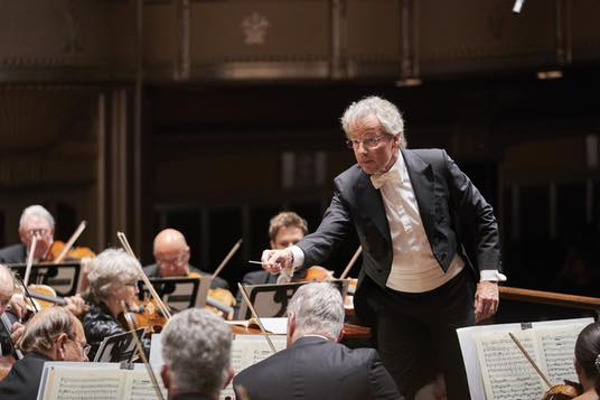Thu 9/28
The Cleveland Orchestra, conducted by Franz Welser-Möst, swept into the 2023-2024 classical season with a brilliant, if unlikely, pairing of works by Brahms and Prokofiev in a well-received concert at Severance Music Center’s Mandel Concert Hall.
The opening work, Johannes Brahms’ Piano Concerto, No. 1 in D minor with soloist Daniil Trifonov, provided a sweeping reminder of why classical music survives — it touches elemental parts of the human spirit (at least for the susceptible it does). Every instrument in the large orchestra blended as one to introduce Brahms’ nuanced and poetic piece. The first notes conjured up various scenarios; in my case, forest walks via wind and strings suggesting sounds created by birds, leaves underfoot, wildlife — all followed by hunters’ hounds (via melodic horns) sounding distantly.
And then. The piano solo which brought a human presence into the scene.
Trifonov’s sensitive and fluid interpretation allowed Brahms to speak of passion, of hesitancy, and of surrender. The first movement’s romantic rushes interspersed, with reflective moments, contrasts the emotions of a young man who can suddenly envision his future as a composer. (An effect, we are told, of meeting composers Robert and Clara Schumann.) The second and third movement logically followed the path set out in the first and concluded with a reminder of motifs introduced at the concerto’s beginnings .
The Brahms was a splendid work to start the season. (One listener, amazed by the soloist’s fluid gestures, wondered, “Does Trifonov even have any bones in his hands?”) As a cool-down, and in response to continuous applause, Trifonov offered us an encore, a brief selection (originally composed for harpsichord) by Rameau (the Allemande from Suite in A).
The second opening night work provided a dramatic contrast to Brahms’ sensual concerto. Sergei Prokofiev’s Symphony No. 6 in E-flat minor, Op. 111 was anything but romantic — although it was passionate. Written after the ravages of World War II (1944-47), and under the supervision of dictator Joseph Stalin and the Central Committee of the Communist party, the work is harsh and full of abstract, often dissonant harmonies. (No sign of the beloved “Peter and the Wolf” — well, perhaps signs of the Wolf.)
If you listen for it, sounds of discontent — blaring horns, sharp percussion, disjointed fragments switching from melody to battle calls — suggest Prokofiev was messaging despair and frustration. The war, now over, had been replaced with new torments. The Russian government banned performances of Symphony No. 6 — perhaps they heard it as a sarcastic retort to censorship; it sounded like one.
Bottom Line: An absolute delight that introduces what appears to be an exciting season. For details check the calendar (and more) at clevelandorchestra.com.
[Written by Laura Kennelly]
